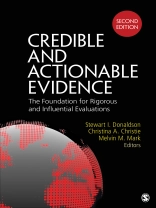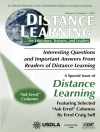Addressing one of the most important and contentious issues challenging applied research and evaluation practice today—what constitutes credible and actionable evidence?—this volume offers a balanced and current context in which to analyze the long-debated quantitative-qualitative paradigms. In the Second Edition, the contributors, a veritable ‘who’s who’ in evaluation, discuss the diversity and changing nature of credible and actionable evidence; offer authoritative guidance about using credible and actionable evidence; explain how to use it to provide rigorous and influential evaluations; and include lessons from their own applied research and evaluation to suggest ways to address the key issues and challenges. Reflecting the latest developments in the field and covering both experimental and non-experimental methods, the new edition includes revised and updated chapters, summaries of strengths and weaknesses across varied approaches, and contains diverse definitions of evidence. Also included are two new chapters on assessing credibility and synthesizing evidence for policy makers. This is a valuable resource for students and others interested in how to best study and evaluate programs, policies, organizations, and other initiatives designed to improve aspects of the human condition and societal well-being.
قائمة المحتويات
Part I: Introduction
1. Examining the Backbone of Contemporary Evaluation Practice: Credible and Actionable Evidence – Stewart I. Donaldson
2. Social Inquiry Paradigms as a Frame for the Debate on Credible Evidence – Christina A. Christie and Dreolin Fleischer
3. How People Judge the Credibility of Information: Lessons for Evaluation From Cognitive and Information Sciences – Robin Lin Miller
Part II: Credible and Actionable Evidence: The Role of Randomized Experiments
4. When Getting It Right Matters: The Struggle for Rigorous Evidence of Impact and to Increase Its Influence Continues – Gary T. Henry
5. Randomized Controlled Trials: A Gold Standard or Gold Plated? – Leonard Bickman and Stephanie M. Reich
6. Demythologizing Causation and Evidence – Michael Scriven
Part III: Credible and Actionable Evidence: Perspectives From a Range of Evaluation Designs and Methods
7. When and How Qualitative Methods Provide Credible and Actionable Evidence: Reasoning With Rigor, Probity, and Transparency – Sharon F. Rallis
8. Seeing Is Believing: Using Images as Evidence in Evaluation – Sandra Mathison
9. Credibility, Policy Use, and the Evaluation Synthesis – Eleanor Chelimsky
Part IV: Credible and Actionable Evidence: General Perspectives
10. How Evidence Earns Credibility in Evaluation – Jennifer C. Greene
11. Actionable Evidence in Context: Contextual Influences on Adequacy and Appropriateness of Method Choice in Evaluation – George Julnes and Debra Rog
12. Credible Evidence of Effectiveness: Necessary but Not Sufficient – Thomas A. Schwandt
13. Credible and Actionable Evidence: A Framework, Overview, and Suggestions for Future Practice and Research – Melvin M. Mark
عن المؤلف
Melvin M. Mark is professor of psychology at the Pennsylvania State University, where he also is Head of the Department of Psychology. He has served as President of the American Evaluation Association (AEA). He was Editor of the American Journal of Evaluation (and is now Editor Emeritus). A social psychologist, Dr. Mark has wide ranging interests related to the theory, methodology and practice of evaluation, as well as a general interest in the application of social psychology to evaluation and applied social research. Dr. Mark’s awards include the American Evaluation Association’s Lazarsfeld Award for Contributions to Evaluation Theory. He is author of more than 125 articles and chapters in books. Among his books are Evaluation: An integrated framework for understanding, guiding, and improving policies and programs and the co-edited volumes Social Science and Social Policy; SAGE Handbook of Evaluation; What Counts as Credible Evidence in Applied Research and Evaluation Practice; Evaluation in Action: Interviews with Expert Evaluators; and Social Psychology and Evaluation.












